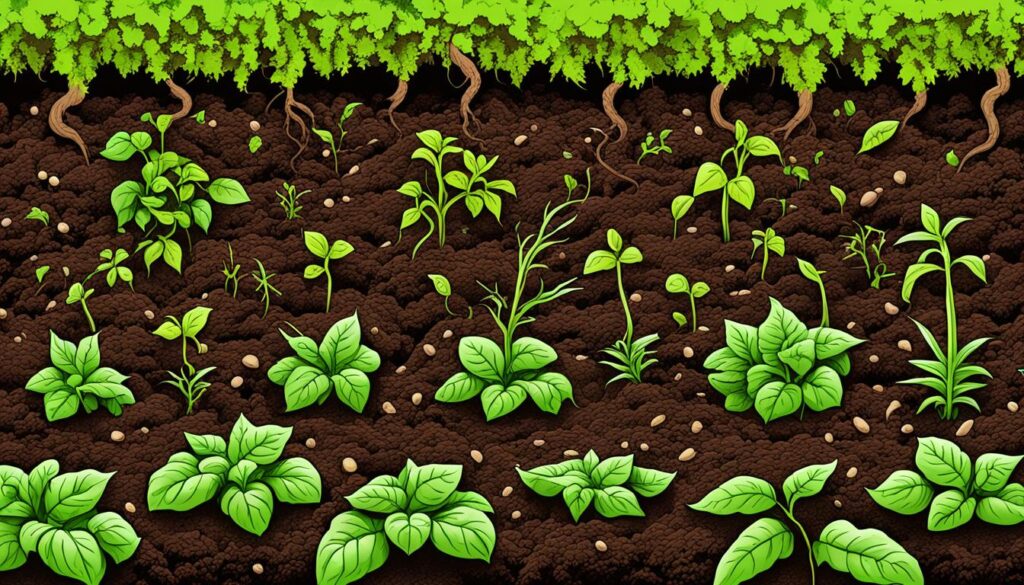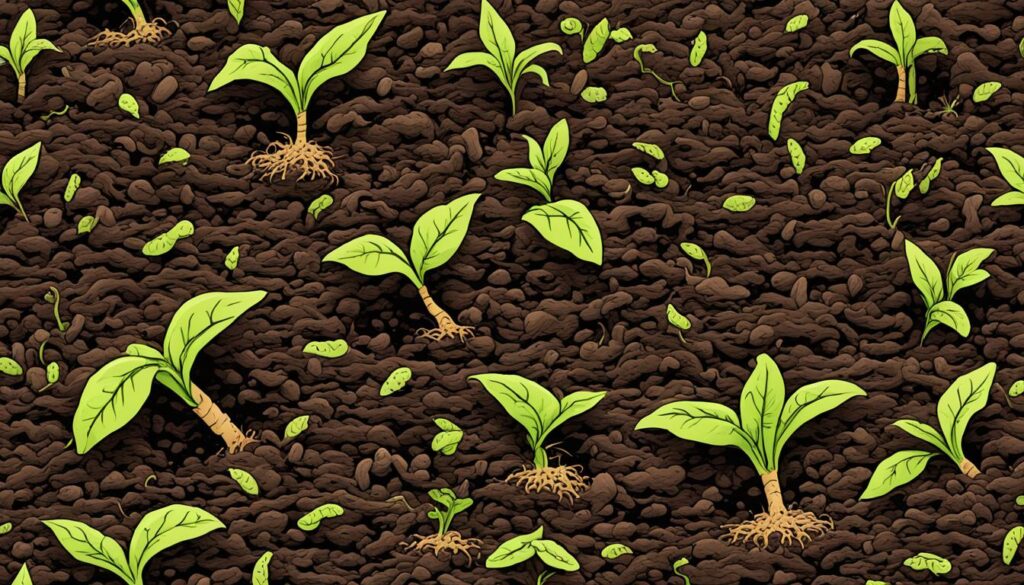Have you ever wondered why some gardens are so lush and vibrant, while others struggle to thrive? It all starts with the soil. Yes, that humble foundation beneath your feet can make all the difference in creating a thriving oasis right in your backyard. So, what is the secret to achieving a garden that bursts with life and color?
In this article, we will dive into the world of organic gardening and explore the importance of soil quality. We’ll uncover the benefits of using the best organic garden soil and how it can help you unlock the full potential of your plants. Get ready to transform your garden into a lush paradise that will leave your neighbors green with envy!
- Soil quality is essential for creating lush gardens.
- Organic gardening methods focus on maintaining ecological balance.
- The right organic garden soil can provide the necessary nutrients for thriving plants.
- Improving soil structure and using organic fertilizers can enhance soil quality.
- Loam soil is the gold standard for gardeners.
The Importance of Soil Quality
The quality of the soil is the backbone of any garden. It determines the health and vitality of your plants, making it crucial to prioritize soil quality in your gardening efforts. Healthy soil provides the necessary nutrients, structure, and support for plant growth, resulting in vibrant and thriving gardens.
One of the key factors in achieving optimal soil quality is the presence of organic matter. Organic matter, such as compost and coco peat, plays a vital role in improving soil structure and enhancing its ability to retain water and nutrients. Adding organic matter to your soil helps create a favorable environment for beneficial microorganisms and earthworms, which contribute to the overall ecosystem of your garden.
“Good soil is the foundation of a bountiful garden.”
Composting is an excellent way to introduce organic matter into your soil. By composting kitchen scraps, yard waste, and other organic materials, you can create nutrient-rich compost that enriches your soil and promotes healthy plant growth. Regularly adding compost to your garden beds replenishes essential nutrients and increases the soil’s ability to retain moisture.
In addition to composting, using organic fertilizers further enhances soil quality. Organic fertilizers, such as neem powder and mustard cake, provide slow-release nutrients that nourish plants over time. These natural alternatives to synthetic fertilizers not only improve soil fertility but also support long-term soil health and sustainability.
Benefits of Using Organic Fertilizers:
- Promotes healthy root growth
- Improves nutrient availability
- Enhances soil structure and aeration
- Increases microbial activity
- Reduces the risk of chemical runoff and pollution
Incorporating organic matter and organic fertilizers into your gardening practices not only improves soil quality but also reduces the reliance on synthetic chemicals and pesticides. This promotes a more natural and sustainable approach to gardening, benefiting both your plants and the environment.
Sample Table:
| Organic Material | Benefits |
|---|---|
| Compost | Improves soil structure and nutrient content |
| Coco peat | Enhances water retention and aeration in the soil |
| Neem powder | Controls pests and diseases naturally |
| Mustard cake | Provides slow-release nutrients for plant growth |
By prioritizing soil quality and incorporating organic matter and fertilizers into your gardening routine, you can create a nutrient-rich environment that fosters healthy plant growth and ensures the long-term success of your garden.
CLICK HERE TO CHECK OUR RECOMMENDED PRODUCTSSoil Organic Matter and Compost
Soil organic matter is the key to maintaining fertile soil in your garden. It is a complex mixture of living organisms, decomposing organic materials, and their byproducts. This rich combination contributes significantly to nutrient cycling and the thriving microbial life that is essential for healthy plant growth. Without an adequate amount of soil organic matter, your garden may struggle to reach its full potential.
One of the best ways to increase soil organic matter is through the use of compost. Compost is often considered the gardener’s secret weapon, and for good reason. It is a dark, crumbly substance that is full of beneficial microbial populations and rich in essential nutrients. Adding compost to your garden beds not only improves soil fertility but also provides slow-release nutrients for your plants, ensuring they have everything they need to thrive.
Compost also plays a vital role in enhancing soil structure. Its organic matter content helps to improve the soil’s ability to hold water, preventing excessive runoff and enabling better moisture retention. Additionally, the presence of compost encourages the formation of stable aggregates, which creates a well-structured soil with good aeration and drainage.
“Compost: the gardener’s secret weapon for fertile soil and healthy plants.”
The benefits of compost extend beyond nutrient availability and soil structure. As compost decomposes, it gradually transforms into a substance called humus. Humus is highly stable and contributes to long-term soil fertility. It acts as a sponge, holding moisture in the soil, while also improving water permeability. Humus also enhances the soil’s ability to bind and retain essential nutrients, reducing nutrient leaching and making them more available to plants.
Incorporating compost into your garden is a simple yet powerful way to boost your soil’s organic matter content and overall health. By utilizing this natural resource, you can create an environment favorable to beneficial microbial life, increase nutrient availability, improve soil structure, and support long-term soil fertility.
Comparing Different Types of Compost
| Type of Compost | Main Ingredients | Nutrient Content | Microbial Activity | Advantages |
|---|---|---|---|---|
| Traditional Compost | Mixed organic materials, such as kitchen scraps, yard waste, and plant matter | Varies depending on ingredients | Medium to high | Easy to make at home, cost-effective |
| Vermicompost | Organic materials processed by worms | High in nitrogen, phosphorus, and potassium | High | Rich in beneficial microbes, enhances nutrient availability |
| Leaf Mold | Decomposed leaves and other organic plant matter | Low to moderate | Low to moderate | Improves soil structure, increases moisture retention |

The Benefits of Loam Soil
Loam soil is truly the gardener’s gold. It possesses a harmonious combination of sand, silt, and clay, which gives it an outstanding composition, making it the ideal choice for cultivating a wide variety of plants.
This nutrient-rich soil offers a wealth of benefits that contribute to the success of your garden. With its excellent drainage capabilities, loam soil prevents waterlogging and allows excess moisture to escape, avoiding the risk of root rot and other water-related issues. At the same time, its moisture retention properties ensure that plants have access to adequate water, even during dry spells.
One of the key advantages of loam soil is its ability to maintain an ideal pH balance. Neutral soil pH levels benefit a diverse range of plants. External factors such as pollution, weather conditions, and nearby structures can influence soil acidity, but loam soil’s inherent balance helps to foster optimal plant growth.
In addition to its moisture management and pH balance, loam soil provides excellent structure for root development. Its well-balanced texture allows roots to penetrate easily, promoting strong root systems and enabling plants to absorb nutrients effectively. This promotes overall plant health and resilience, resulting in vibrant and thriving gardens.

Whether you’re growing vegetables, flowers, or shrubs, loam soil is an invaluable asset. Its nutrient-rich composition, good drainage, moisture retention, ideal pH balance, and excellent structure provide the perfect foundation for your garden’s success. Incorporating loam soil into your gardening repertoire ensures that your plants receive the optimal growing conditions they deserve.
Conclusion
Unlock the full potential of your plants and create lush, thriving gardens by focusing on soil quality and embracing organic gardening methods. The key to achieving this lies in choosing the best organic garden soil, such as nutrient-rich loam soil, which provides the necessary nutrients, drainage, and structure for optimal plant growth.
With proper soil preparation, including adding compost and organic matter, carefully selecting plants, and regular maintenance, you can transform your garden into a vibrant oasis. The benefits of using the best organic garden soil are manifold – from improved plant health and growth to enhanced soil structure and moisture retention.
By following organic gardening practices, you are not only creating a beautiful garden for yourself, but also promoting a healthier and more sustainable environment. Embrace the power of organic gardening and watch your garden thrive, showcasing the beauty of nature at its finest.
FAQ
Why is soil quality important in gardening?
Soil quality is essential for achieving lush, vibrant gardens. The right balance of nutrients, texture, and composition is crucial for plants to reach their full potential.
How do organic gardening methods improve soil quality?
Organic gardening methods focus on maintaining and enhancing ecological balance in the garden. By increasing biodiversity, improving soil, and using organic fertilizers, gardeners can create thriving and beautiful gardens.
What is soil organic matter?
Soil organic matter is critical for maintaining fertile soil. It consists of living, dead, and decomposing organisms that contribute to nutrient cycling and microbial life.
How does compost benefit the soil?
Compost, often referred to as the gardener’s secret weapon, is rich in microbial populations and nutrients. Adding compost to garden beds improves soil fertility and provides slow-release nutrients for plants. Compost also enhances soil structure and water retention.
Why is loam soil recommended for gardening?
Loam soil is nutrient-rich, has good drainage, retains moisture, maintains an ideal pH balance, and offers excellent structure for root development. These characteristics make it a favorite choice for gardeners.
